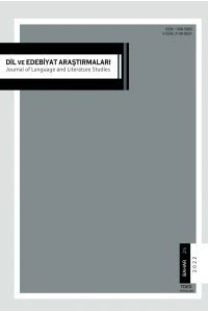Objects of Oppression: An Ecofeminist Reading of Tar Baby by Toni Morrison
Objects of Oppression: An Ecofeminist Reading of Tar Baby by Toni Morrison
Formulated in the twentieth century, ecofeminism is a body of literature that seeks to identify the relationship between the oppression of nature and women. In this context, the traditional roles of nature and women have been examined in various social fields, such as literature, philosophy, sociology, and psychology. Although its historical roots go back to the 1970s, this approach gained wider recognition in the 1990s, with current developments in differ- ent fields. As the theoretical background of this study, ecofeminism clarifies the conceptual links, especially in patriarchal societies, between nature and women, in terms of domination, oppression, colonialism, sexism, and racism. This study attempts to analyze Toni Morrison’s novel Tar Baby (1981) by applying principles and considerations of ecofeminism through male/female and human/non-human dichotomies. As a writer who is concerned with all va- rieties of domination, Morrison, in Tar Baby, foregrounds the exploitation of nature to raise ecological awareness and wisdom, and to mark the fragmentation, displacement, and assim- ilation of women in a male-dominated world. This study confirms that there is a strong link between the oppression of nature and the oppression of women in male-dominated societies.
Keywords:
Ecocriticism, Ecofeminism, Oppression, Toni Morrison Tar Baby,
___
- Dash, B. C. (2019). Toni Morrison’s Tar Baby: A Study in Ecocritical Perspective. Literary Endeavour, 10 (3), 160-163.
- Estok, S. (2009). Theorizing in a Space of Ambivalent Openness: Ecocriticism and
- Ecophobia. Interdisciplinary Studies in Literature and Environment, 16 (2), 203-225.
- Everson, S. C. (1989). Toni Morrison’s Tar Baby: A Resource for Feminist Theology. Journal of Feminist Studies in Religion, 5 (2), 65-78.
- Gaard, G. (2001). Women, Water, Energy: An Ecofeminist Approach. Organization & Environment, 14 (2), 157-172.
- Gaard, G. (2010). New Directions for Ecofeminism: Toward a more Feminist Ecocriticism. Interdisciplinary Studies in Literature and Environment, 17 (4), 643-665.
- Gaard, G. (2011). Ecofeminism Revisited: Rejecting Essentialism and Re-Placing Species in a Material Feminist Environmentalism. Feminist Formations, 23 (2), 26-53.
- Glotfelty, C. (1996). “Literary Studies in an Age of Environmental Crisis”. Glotfelty and
- Fromm, Eds. In The Ecocriticsm Reader: Landmarks on Literary Ecology. The University of Georgia Press: Athens.
- Jackson, C. (1993). Women/Nature or Gender/History? A Critique of Ecofeminist ‘Development’. The Journal of Peasant Studies, 20 (3), 389-418.
- Kouassi, S. M. (2018). “They could defecate over a whole people […] and defecate some more by tearing up the land”: Ecological (Un)consciousness and Resistance in Toni Morrison’s Selected Novels. The International Journal of Social Sciences and Humanities Invention, 5(12), 5207-5213.
- Lutz, J. (2013). Sealskins and Original Dimes: Exploitation, Class, and Commodity Fetishism in Toni Morrison’s Tar Baby. Critique: Studies in Contemporary Fiction, 54 (1), 56-69.
- Mills, F. (2001). Diasporic Displacement and the Search for Black Female Identity in Toni Morrison’s Tar Baby and Nadine Gordimer’s None to Accompany Me. The Journal of South African and American Studies, 2(4), 1-8.
- Morgan, R. (1970). Sisterhood is Powerful: An Anthology of Writings from the Women’s Liberation Movement. New York: Vintage.
- Morrison, T. (1993). Tar Baby. New York: Random House.
- Oppermann, S. (1999). Ecocriticism: Natural World in the Literary Viewfinder. Hacettepe University Literature Faculty Journal, 16 (2), 29-46.
- Ortner, S. B. (1974). “Is Female to Male as Nature Is to Culture?” Michelle Zimbalist, Ed. In Woman, Culture, and Society. Stanford: Stanford UP.
- Plumwood, V. (1986). Ecofeminism: An Overview and Discussion of Positions and Arguments. Australasian Journal of Philosophy, 64 (1), 120-138.
- Plumwood, V. (1993). Feminism and the Mastery of Nature. London: Routledge.
- Ruether, R. R. (1975). New Woman, New Earth: Sexist Ideologies and Human Liberation. Boston: Beacon.
- Wardi, A. (2011). “Loud with the Presence of plants and field life”: The Ecology of Resistance in Toni Morrison’s Tar Baby. The Journal of Ecocriticism, 3 (1), 1-16.
- Warren, K. (1996). Ecological Feminist Philosophies. Bloomington: Indiana UP.
- White, L. (1996). “The Historical Roots of Our Ecologic Crisis”. Glotfelty and Fromm, Eds. In The Ecocriticsm Reader: Landmarks on Literary Ecology. The University of Georgia Press: Athens.
- Wu, L. (2019). Reading The Color Purple from the Perspective of Ecofeminism. Theory and Practice in Language Studies, 9 (8), 965-972.
- Wyatt, J. (2014). The Economic Grotesque and the Critique of Capitalism in Toni Morrison’s Tar Baby. MELUS, 39 (1), 30-56.
- Tiffin, H. (2005). “Man Fitting the Landscape: Nature, Culture and Colonialism”. DeLoughrey, Gosson, and Handley, Eds. In Caribbean Literature and the Environment: Between Nature and Culture. Charlottesville: University of Virginia Press.
- ISSN: 1308-5069
- Yayın Aralığı: Yılda 2 Sayı
- Başlangıç: 2010
- Yayıncı: TÜRKİYE DİL VE EDEBİYAT DERNEĞİ
Sayıdaki Diğer Makaleler
Beyond Binary: Rethinking Orthographic Depth Through the Lens of Turkish Orthography
Turgut Uyar’ın Şiir Karakteristiği ve “Hiçsizliğe” Şiiri
Klasik Türk Şiiri’nde Vahdet-i Vücûd Felsefesi
Osmanlı Mizahında Kayzer Wilhelm İmajı
Yunus Emre’nin Meşhur ve Meçhul Bir Şiiri Üzerine Bazı Mülahazalar
Janus’un Yüzü Ve Türk Edebiyatında Kanon, Karşı-Kanon Meselesi
Mustafa GÜNEŞ, Mümin HAKKIOĞLU
